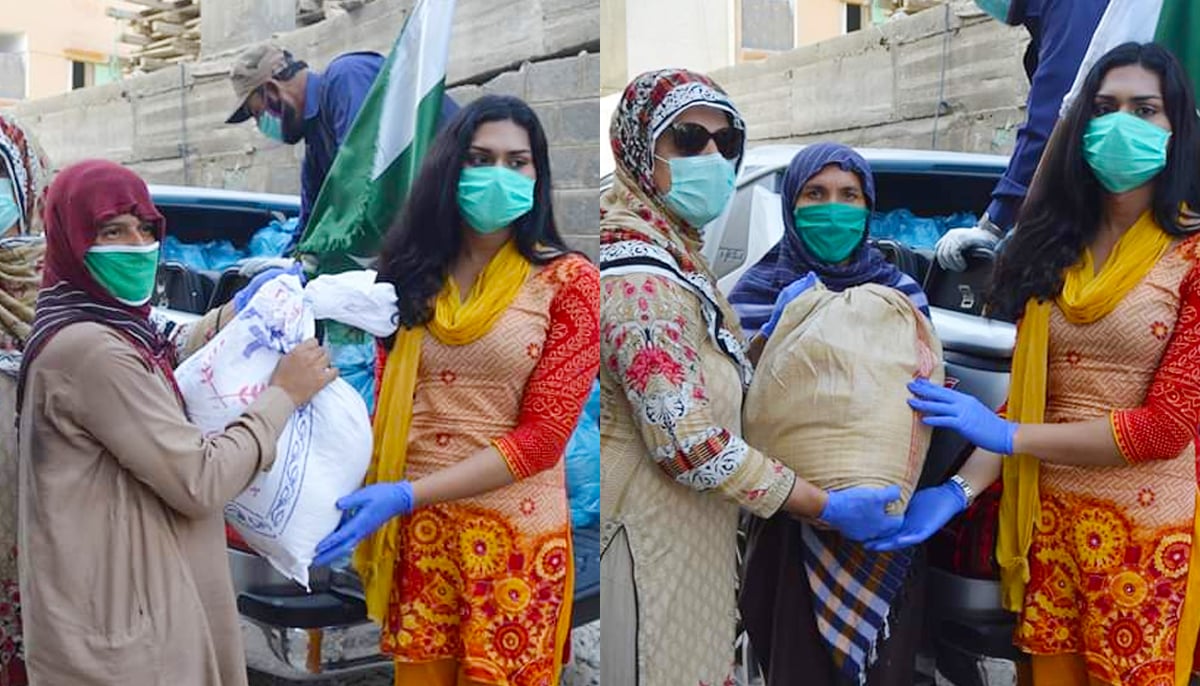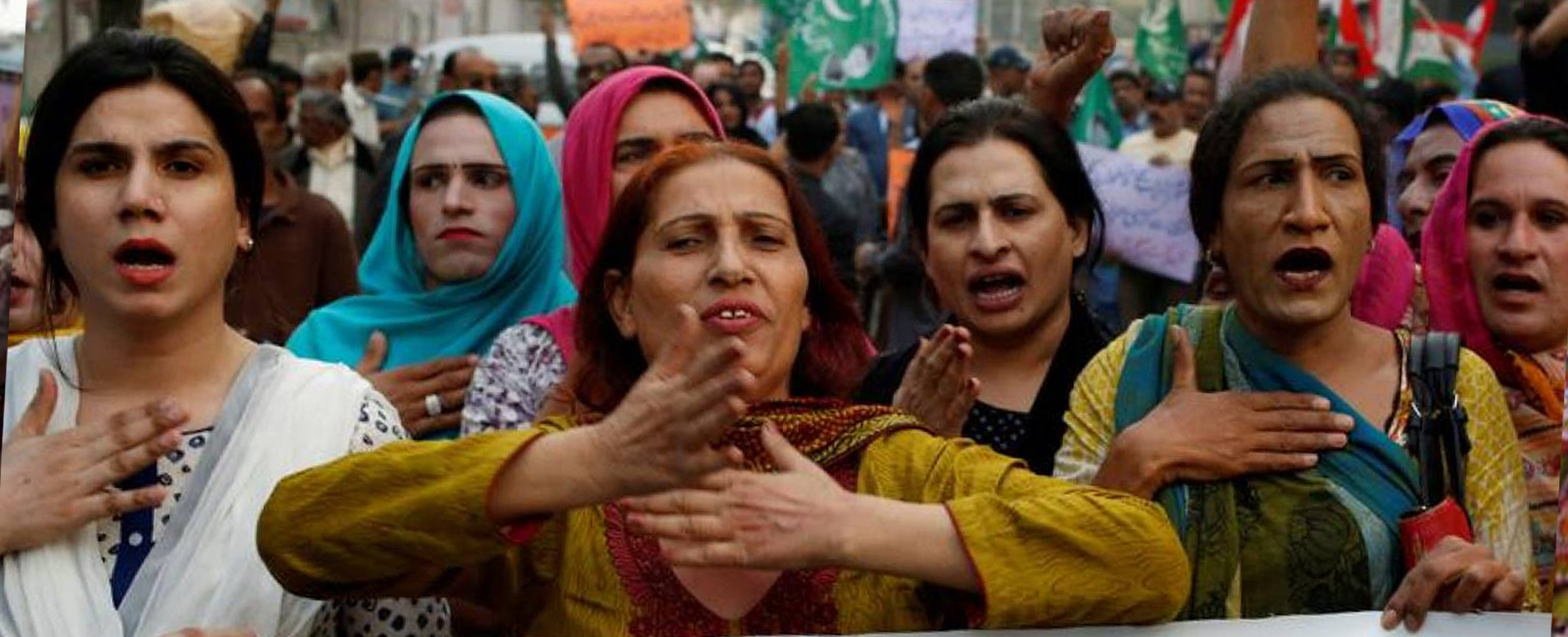Transgenders bear the brunt of virus lockdown, say they are 'most affected'
Hunger will kill us if coronavirus doesn’t, says Bindiya Rana, president of the Gender Interactive Alliance

The coronavirus pandemic has claimed over 300,000 lives worldwide and infected more than four million people. The infection, which has spread to over 200 countries and territories ever since it began from a wet market in Wuhan, has caused financial crunches across the globe, and Pakistan is no exception — leaving the vulnerable transgenders in peril.
Governments all over the world are mulling over strategies to stem the virus while the World Health Organisation has stressed on imposing lockdowns to curb COVID-19 and stop it from causing further damage.
The transgender community — the majority of whom eke out a living through begging and by doing other non-desirable work — are bearing the brunt of the lockdown imposed across the country as they have scarce financial and medical supplies leaving the social pariahs in a plight.
The United Nations High Commissioner for Refugees has also highlighted their predicament.
“[Trans] people may be particularly vulnerable during the COVID-19 pandemic. People living with compromised immune systems, including some persons living with HIV/AIDS, face a greater risk from COVID-19. Homeless persons, a population that includes many [trans] people, are less able to protect themselves through physical distancing and safe hygiene practices, increasing their exposure to contagion,” it said in a statement.
'Hunger will kill us'
Bindiya Rana, the president of the Gender Interactive Alliance (GIA), believes that the trans community has been the “most affected” due to the lockdown and has called on masses to help them out in these pressing times.
“The major issue that we are facing is the lack of essential food items. Hunger will kill us if coronavirus doesn’t,” Rana said.
Rana said that transgenders who are ill are “unable” to get medical supplies for themselves due to a lack of financial resources.
“If the lockdown would have been imposed for two weeks or so, we could cope with it but now we are unable to help our peers due to shortage of funding. We are screaming and calling out to the world to help us,” Rana said.
“The GIA is working hard to provide for the community but there is only so much that we can do. The province and the Centre have given us sympathy and solace, which does not satisfy hunger,” she said.
Rana said that when a person from her community sends a message in a bid to get aid from the Ehsaas Programme, “some of them receive messages that they are not eligible as their families earn enough”.
According to Rana, the majority of the transgenders live alone and not with their families, "The government needs to set up a separate portal for us so that we can register ourselves over there.”
“We don’t want the people’s money, give us ration so that we can distribute it among our community. I get calls every day from my people crying for food,” the GIA head said.
“They are those who have been turned away by their families, they are those who have no heir […] They are in need of a messiah right now,” Rana added.
Mental illness
Speaking about the plight of the transgender community further, Aradhiya Khan, a young trans activist, said the problems the community was facing were vast.
She said the major issue currently faced by them is mental illness and financial burden.

“A lot of non-governmental organisations (NGOs) and people, in general, have reached out to the trans community. I haven’t seen such support ever. But it is still not enough. We need more,” Khan said.
“People have been providing food, but how can they pay rent and arrange medical supplies — especially since the transgenders are still coping with AIDS,” Khan said. "There is such a low level of literacy that it's very hard to spread awareness about the disease and how to conduct strict precautions. We are still struggling with the breakout of HIV-AIDS in our community. Now, this is something completely new. And the major thing is there is no testing in our community for the disease. How can we say the community is safe from the coronavirus when there are no tests being conducted?"
Highlighting a few NGOs and transgender activists that, according to Khan, were doing commendable work on ground, the young activist said, “GIA was not only looking after the necessities but was also providing counselling and therapy to the distressed."
"Inheritors Of Karachi, Karachi Corona Relief Fund and other organisations have come forward and did whatever is possible for them. Individuals like Zehrish Khan, Shahzadi Rai, and Bindiya Rana are doing tremendous work," Khan added.
“The government has not supported us. It needs to wake up and do its end of the bargain,” Khan said, adding, “In their [governmental] schemes CNIC is necessary which several of the community members do not possess.”
“Government needs to help the marginalised community because they get neglected in such a critical situation,” the young activist said. “How can we trust the government when we receive no help from them during these pressing times?"
Free treatment
Meanwhile, Sindh government spokesperson Murtaza Wahab has said the province has helped the community where they could.
“Wherever it [Sindh government] identified that they needed ration we provided it to them. We have given them groceries and rations in Karachi,” Wahab said.
Talking about how the government aims to help them when it comes to conducting COVID-19 tests, he said, “If it is conveyed to the government that someone from the community is exhibiting symptoms then we will get them tested for COVID-19 and pay for their medical expenses.”
“The principle of Sindh government is very simple that we will bear the expenses of those who cannot bear it themselves — the government has [already] paid for 80-90% of the tests conducted in the province,” Wahab expressed.
“We are not discriminating between men, women, and transgenders. Since the transgender community does not have enough resources to afford the treatment, we will support them in getting tested and God forbid if a person needs to be isolated our team will be ready to help them,” he added.
Header and thumbnail: Trans activists take part in a demonstration in Karachi. — Reuters




